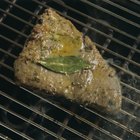No one wants to be known as "the co-worker who smells like fish." Yet, even if you take hygiene seriously, fishy odors can creep into your wardrobe. Keep your nose attuned to fish smells and what causes them. Preventions and treatments are there, but you must first get to the root of the problem.
Fish Products
Gardeners and cooks can get a fishy smell on their clothing simply from fish products. Fish sauce, oyster sauce, Caesar dressing and other sauces found in the kitchen contain ocean products that can leave a pungent smell behind until clothing is washed -- and sometimes even after. In the garden world, fish emulsion is a common organic fertilizer. It encourages earthworm population to grow and gives needed nutrients to the soil. However, it can also make your clothing smell if you spill it on yourself.
Normal Body Odor
Body odor naturally transfers from a person's body onto their clothing. Often, the smell of the odor on the clothing can get stronger than the odor on the body, especially if clothes are worn multiple times between washings. To avoid body odor smell on clothing, shower regularly, wear deodorant and regularly wash your clothes with plenty of soap and water. Also, note that polyester clothing is much more likely to smell than cotton or wool clothing, so if a fishy smell is a problem, stick to natural fibers.
Trimethylaminuria
Trimethylaminuria, also known as fish odor syndrome, is the result of a rare, genetic metabolic disease. It causes a strong fishy body odor smell that can come and go as hormones fluctuate. This smell will easily transmit to clothing. The disorder can cause much embarrassment and difficulty for the person who has it. Prevention includes avoiding certain foods and supplements and reducing circumstances that cause sweating, such as exercise and anxiety. Washing clothing frequently can help but will not fix this disorder.
Mildew
Mildew can give off a wet, fishy smell and can easily inhabit stored clothing. Mildew colonies need something to live on, and the bacteria on soiled clothing is a good start, so always wash clothing before storing it. Also, try to hang it in the sun occasionally to air it out, and store it in a cool, dry place. If your clothing already has a mildewy smell, wash it with vinegar instead of detergent. Use 1/4 cup of white vinegar per load.
Related Articles

How to Get Rid of the Odd Smell in a ...

How Long Does Tilapia Last Refrigerated?

How to Wash Clothes Affected by Smoke

Dangers of Spoiled Ground Beef

If Chicken Smells Bad Can You Still ...

How to Freeze Catfish

How to Brine Fish Before Cooking It

The Best Way to Smoke Yellowtail

Can You Eat Sockeye Salmon Raw?
Brine for Cooking Fish

Does Bird Seed go Bad?

How to Remove Crayola Paint From ...

Is Orange Roughy Safe to Eat?

How to Cook Permit Fish

Can I Cut Freezer-Burn Off a Tuna Steak ...

List of Foods Containing Shellfish

How to Keep Your Shirts From Getting ...

How to Kill Lice on Clothes With the ...

How to Make Dried Fish

Why Does Milk Curdle When it Is Mixed ...
References
- University of Missouri Extention; How to Prevent and Remove Mildew — Home Methods; Wanda Eubank and Betty Feather; April 1998
- National Institute of Health; Genetics Home Research; Trimethylaminuria
- Cornell College: Cornell Wilderness Team 2010; What to Bring
- House Cleaning Central: Remove Mildew Smell From Clothes
Writer Bio
Sophia Sola has been a writer and editor for over six years. She co-owns Sirius Prose Editing & Writing Service and has experience ranging from authoring magazine articles to editing Ph.D. dissertations. She has been published in the "Earth First! Journal" and on Tivix.com, JSI Top 21 Record Reviews and other websites.